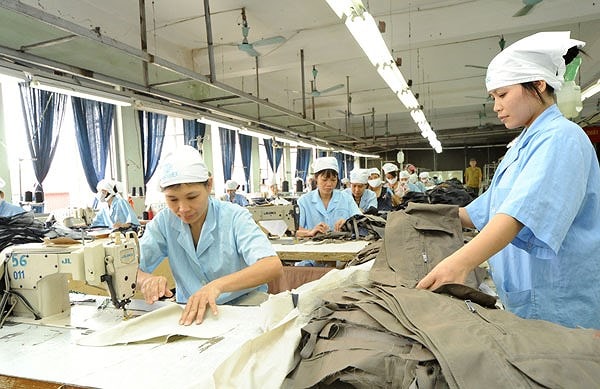More than 80% of leather, footwear and textile workers may lose their jobs.
This is the information given at the 2018 National Conference on Sustainable Development that was recently held.
The "invasion" of robots and artificial intelligence
During the discussion session at the conference, Mr. Pham Van Thinh, General Director of Deloitte Vietnam, informed: “I have just received an invitation from the Central Economic Committee to attend a conference scheduled to be held on July 12-13. At this conference, the United Nations Development Program (UNDP) will bring the first robot granted human rights named Sofia and will have an exchange right at the conference.”
Mr. Thinh mentioned the robot Sofia to emphasize the issue of artificial intelligence and its impact on human employment in the next 10 years. “There will be a lot of changes in employment in the next 10 years,” Mr. Thinh commented.

Female workers will be 'compensated' for their pensions
The Ministry of Labor, Invalids and Social Affairs is drafting a Decree adjusting pensions for female workers retiring from January 1, 2018 to December 31, 2021.
Mr. Kamal Malhotra cited data from the Organization for Economic Cooperation and Development (OECD) saying that 14% of jobs have been automated, 23% of jobs in developing countries will be replaced by automated machines. Of which, 86% of jobs in the textile, footwear and leather industries, 13% of workers in the non-agricultural sector are at risk of losing their jobs.
 |
| Women are the most affected if stages in the textile industry are replaced by machines. |
This figure will also be similar in Vietnam. Director of the Department of Employment, Ministry of Labor, Invalids and Social Affairs Le Kim Dung also noted that in the leather, footwear and textile industry alone, 80% of the workers are women. Therefore, women are the most affected group according to the assessment of job loss that Mr. Kamal Malhotra mentioned.
Proposal to tax robots
In the face of the whirlwind of automation and the involvement of machines, Mr. Kamal Malhotra said that there has been a proposal to tax robots to avoid income gaps. He also recommended that Vietnam increase training for workers in small and medium enterprises along with income distribution to facilitate human resource development.
Meanwhile, Mr. Ousmane Dione, World Bank Country Director in Vietnam, pointed out three factors that determine the future of jobs in Vietnam. He said that the book “The Future of Jobs in Vietnam” is the latest edition of the World Bank, made at the request of Deputy Prime Minister Vu Duc Dam since 2016 to conduct an in-depth diagnosis of the domestic employment situation to take appropriate steps. From the research, the World Bank discovered that there are three factors that need to be coordinated to ensure better jobs in Vietnam. These are modern industries, traditional industries, labor force and labor market institutions.
“Modern industry is where Vietnam’s best jobs are – offering higher productivity, higher wages and better social benefits,” said a WB representative. The key point of this industry, as pointed out by the WB, is that Vietnam must move away from the “factory” position of the world and take advantage of opportunities that have not been done well before.
The second gear is traditional sector employment, which plays an important role in the economy because it is a source of employment for disadvantaged people (ethnic minorities, the elderly, and the less educated). Integrating traditional sector jobs into the economy is important for poverty reduction. For example, shifting from rice cultivation to coffee and pepper cultivation, which can earn 3-5 times more.
Finally, the labor force and labor market institutions. People are essential for Vietnam’s growth as it moves up the global economic ladder. Therefore, the government and the private sector need to build skills for employment. These include flexibility, higher-order cognitive and social skills, and transferable skills across industries.
“They need to work like cogs in a machine, maintaining harmony and coordination to keep the “job creation machine” running smoothly,” said Mr. Ousmane Dione.
Mr. Ousmane Dione also said that the future of jobs lies in the hands of the private sector. “There must be a vibrant private sector to create jobs. The number of jobs created in this sector will offset the number of workers who lose their jobs every year,” said the WB representative, noting that jobs will also be created when Vietnamese private enterprises participate in higher value chains than at present and connect with multinational enterprises as well as other economic sectors in the country.

